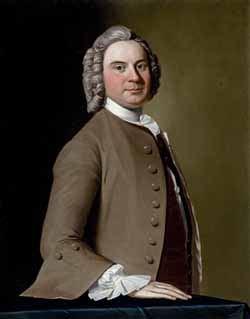“Not to write for any goods after the first of June”
Boston’s patriotic celebration of the king’s birthday on 4 June 1768 papered over a deep political divide.
That divide had opened when the Townshend Act imposed tariffs on certain commodities imported into the colonies. North Americans protested on the practical ground that those tariffs hurt the economy, particularly by moving hard currency to Britain. And they protested on the philosophical ground that even Parliament had no right to raise revenue from populations not represented in Parliament.
North Americans had made the same basic complaints about the Stamp Act of 1765. They had convinced a new government in London to repeal that tax through a combination of formal protests, boycotts, and riots. So they were going back to the same playbook.
On 4 Mar 1768, John Rowe (shown above) recorded in his diary what he and his fellow import merchants had agreed to do:
Thus, as June 1768 began, Boston’s mercantile community had just committed to “non-importation” of all goods from Britain, with a few exceptions of raw materials and tools that the local fishing and weaving industries needed.
It’s notable that, although the merchants met “at the Townhouse in the Representatives Room,” they were not an elected body. They were more like a chamber of commerce. They didn’t represent the whole population of Boston. Political leaders from outside the business community—such as James Otis, Jr., Samuel Adams, and the newcomer Dr. Thomas Young—weren’t involved.
That division would become an issue in the coming years.
That divide had opened when the Townshend Act imposed tariffs on certain commodities imported into the colonies. North Americans protested on the practical ground that those tariffs hurt the economy, particularly by moving hard currency to Britain. And they protested on the philosophical ground that even Parliament had no right to raise revenue from populations not represented in Parliament.
North Americans had made the same basic complaints about the Stamp Act of 1765. They had convinced a new government in London to repeal that tax through a combination of formal protests, boycotts, and riots. So they were going back to the same playbook.
On 4 Mar 1768, John Rowe (shown above) recorded in his diary what he and his fellow import merchants had agreed to do:
In consideration of the Great Scarcity of mony which has for several years been so Sensibly felt among us & now must be Rendred much Greater not only by the immense Sums absorbd in the Collection of the Dutys lately imposd but by the great checks given thereby to Branches of Trade which yeilded us the most of our mony & means of Remittance,—The word went out as planned, and on 2 May Rowe wrote that he
In consideration also of the great Debt now standing against us which if we go on Increasing by the excessive Imports we have been Accustomd to while our Sources of Remittance are daily drying up, must terminate not only in Our Own & Our Countrys Ruin but that of many of our Creditors on the other side of the Water [i.e., in Britain]—
In consideration farther of the Danger from Some Late Measures of our Loosing many Inestimable Blessings & advantages of the British Constitution which Constitution we have ever Rever’d as the Basis & Security of all we enjoy in this Life, therefore Voted
That we will not for one Year send for any European Commoditys excepting Salt, Coals, Fishing Lines, Fish Hooks, Hemp, Duck, Bar Lead, Shot, Wool Cards & Card Wire and that the trading towns in the province & other provinces in New England together with those in New York New Jersy & Pensilvania be Invited to Accede hereto—
2nd That we will encourage the Produce & manufactures of these colonies by the use of them in Preference to all other manufactures—
3d That in the Purchase of Such Articles as we shall stand in need off, we will give a Constant Preference to such Persons as shall subscribe to these Resolutions—
4 That we will in our Separate Capacitys inform our several Correspondents of the Reasons & point out to them the necessity of witholding our usual Orders for their Manufactures—the said Impediment may be Removd & Trade & Commerce may again flourish—
5 That these Votes or Resolutions be Obligatory or binding on us from & after the time that these or other Singular or tending to the same Salutary Purpose be adopted by most of the Trading Towns in this & the neigbouring Colonies—
6 That a Comittee be appointed to Correspond with merchants in the before mentiond Towns & Provinces & forward to them the forgoing Votes & that sd Committee be Impower’d to call a meeting of the merchants when they think Necessary—
met the Merchants at the Townhouse in the Representatives Room—agreed to the Resolutions of the City of New York—not to write for any goods after the first of June, nor Import any after the first Day of October, untill the Act Imposing Dutys on Glass Paper &c be RepealdThe merchants of Gloucester made the same commitment that day.
Thus, as June 1768 began, Boston’s mercantile community had just committed to “non-importation” of all goods from Britain, with a few exceptions of raw materials and tools that the local fishing and weaving industries needed.
It’s notable that, although the merchants met “at the Townhouse in the Representatives Room,” they were not an elected body. They were more like a chamber of commerce. They didn’t represent the whole population of Boston. Political leaders from outside the business community—such as James Otis, Jr., Samuel Adams, and the newcomer Dr. Thomas Young—weren’t involved.
That division would become an issue in the coming years.


No comments:
Post a Comment